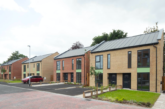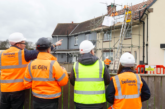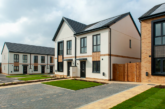
Gavin Smart, deputy chief executive of the Chartered Institute of Housing, discusses the need for more truly affordable homes and greater support and funding for housing providers to deliver them.
Home ownership is at a 30-year low, private renting is at a 40-year high and homelessness has been steadily rising since 2010 — the evidence that more and more people are struggling to afford a place to call home seems to grow by the day.
This is mirrored in public perception; research we recently completed with Ipsos Mori showed 79% of people believe young people will not be able to access a home they can afford, even if they work hard and have a good job.
It all points to one thing — we have to build more homes. In fact we need 200,000 to meet new need and closer to 250,000 to meet the backlog. We are currently nowhere near this level of building.
Recent research by the Resolution Foundation highlighted a nationwide drop in home ownership — falling from a peak of 71% in 2003 to 64%. In areas like Greater Manchester the fall was even more pronounced. The Government’s response was to reinforce its pledge to build thousands of new homes ‘exclusively for first-time buyers’ — once again demonstrating its focus lies squarely with home ownership.
But the problem is not just that we’re not building enough homes for first-time buyers; it’s that we’re not building enough homes that people can afford for purchase or rent. For 25-30% of people in the UK, owning a home is simply not a realistic prospect and our housing strategy must reflect this. Too many people, particularly younger people, are finding themselves priced out of buying a home and left with no alternative but to grapple with increasingly expensive private rents.
Housing shortage
Our UK Housing Review demonstrates that private renting doubled from 10% in 2002 to almost 20% in 2014. And work by Shelter has shown more than half of private tenants struggle to pay their rent. The ending of a private tenancy also remains by far the biggest cause of homelessness.
It’s no surprise there’s a shortage of homes for rent that people can afford when one looks at where the Government is directing its housing investment. Our analysis has shown that of the £45bn invested in housing in the five years up to 2020/21; only £2bn is directed to sub-market rented properties. This has to change.
If the human case for building more homes people can afford is not clear enough, there’s an economic case too.
During the 2008 financial crisis the Government boosted the Homes and Communities Agency’s grant programme by £1.7bn as a deliberate stimulus to construction. Two-thirds of that came from underspends in other departments and one-third from reallocating DCLG spending, proving that counter-cyclical investment programmes do not always require new borrowing. Affordable housing construction output subsequently increased to over 56,000 units in 2010-11, the country kept building and the positive impact on the economy was significant.
There are numerous opportunities for the Government to boost the supply of affordable housing, from committing to more investment in the Autumn Statement, to affording local authorities more flexibility to build new homes and rethinking planning gain requirements. We need more homes that people can afford and we need to give the organisations able to deliver them the funding, support and flexibility to do so.








